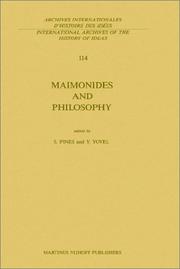| Listing 1 - 10 of 91 | << page >> |
Sort by
|
Book
Year: 1936 Publisher: Paris : Payot,
Abstract | Keywords | Export | Availability | Bookmark
 Loading...
Loading...Choose an application
- Reference Manager
- EndNote
- RefWorks (Direct export to RefWorks)
Book
ISBN: 2266139452 9782266139458 Year: 2004 Publisher: Paris : Pocket,
Abstract | Keywords | Export | Availability | Bookmark
 Loading...
Loading...Choose an application
- Reference Manager
- EndNote
- RefWorks (Direct export to RefWorks)
Judaïsme --- Rabbins --- Philosophes juifs --- Philosophie. --- Moïse Maïmonide, --- Moïse Maïmonide, --- Maïmonide, Moïse. --- Maïmonide, Moïse,
Book
Year: 1964 Publisher: Paris : Presses universitaires de France,
Abstract | Keywords | Export | Availability | Bookmark
 Loading...
Loading...Choose an application
- Reference Manager
- EndNote
- RefWorks (Direct export to RefWorks)

ISBN: 9024734398 Year: 1986 Publisher: Dordrecht Boston Lancaster Nijhoff
Abstract | Keywords | Export | Availability | Bookmark
 Loading...
Loading...Choose an application
- Reference Manager
- EndNote
- RefWorks (Direct export to RefWorks)
Book
ISBN: 2251760105 225190574X 9782251760100 Year: 1998 Volume: 8 Publisher: Paris : Les Belles Lettres,
Abstract | Keywords | Export | Availability | Bookmark
 Loading...
Loading...Choose an application
- Reference Manager
- EndNote
- RefWorks (Direct export to RefWorks)
Philosophie juive. --- Maimonide, Moïse, --- Philosophie juive --- Savants juifs --- Maimonides, Moses, --- Maimonide, Moïse, --- Moïse Maïmonide, --- Maimonides, Moses. --- Critique et interprétation. --- Philosophy.
Book
ISBN: 0870682490 9780870682490 Year: 1975 Publisher: [New York] : Ktav Pub. House,
Abstract | Keywords | Export | Availability | Bookmark
 Loading...
Loading...Choose an application
- Reference Manager
- EndNote
- RefWorks (Direct export to RefWorks)
Philosophy, Medieval. --- Thomas, --- Maimonides, Moses, --- Thomas, --- Maimonide, Moïse,
Book
Year: 1951 Publisher: Paris : PUF - Presses Universitaires de France,
Abstract | Keywords | Export | Availability | Bookmark
 Loading...
Loading...Choose an application
- Reference Manager
- EndNote
- RefWorks (Direct export to RefWorks)
Book
ISBN: 3934012108 9783934012103 Year: 2001 Volume: 4 Publisher: Neckargemünd Mnemosyne
Abstract | Keywords | Export | Availability | Bookmark
 Loading...
Loading...Choose an application
- Reference Manager
- EndNote
- RefWorks (Direct export to RefWorks)
Carl Leonhard Reinhold, abtrünnig gewordener Jesuit, Freimaurer und Illuminat, Schwiegersohn Wielands und 'Kantinaner der ersten Stunde' in Jena, zeigt in den "Hebräischen Mysterien", daß bereits Mose im Grunde seines Herzens dem 'All-Einen' huldigte, seinen philosophischen Gottesbegriff, den er aus den ägyptischen Mysterien übernommen hatte, aber aus politischen Gründen vor seinem Volk geheim hielt und in das Gewand eines nationalen Schutzgottes hüllte. Friedrich Schiller griff in seiner Vorlesung "Die Sendung Moses" die Grundgedanken Reinholds auf, radikalisierte sie und zeigte, daß Moses „zum Besten der Welt und der Nachwelt" ein Verräter der ägyptischen Mysterien werden mußte. Beide Schriften gehören in den Kontext der Spinoza-Renaissance und des Pantheismus-Streits, der die geistige Elite Deutschlands am Ende des 18.Jahrhunderts in seinen Bann schlug. Sie werden hier (erstmalig seit 1787 bzw. 1790) in der ursprünglichen Gestalt abgedruckt und von Jan Assmann kommentiert.
Moïse Maïmonide, --- Social organizations --- Jewish religion --- Mysteries, Religious --- Moses (Biblical leader) --- Freemasonry --- Mose --- Religious aspects --- Judaism --- Freemasonry - Religious aspects - Judaism --- Moïse Maïmonide, - 1135-1204
Book
ISBN: 9780674051607 0674051602 Year: 2013 Publisher: Cambridge, Mass. : Harvard University Press,
Abstract | Keywords | Export | Availability | Bookmark
 Loading...
Loading...Choose an application
- Reference Manager
- EndNote
- RefWorks (Direct export to RefWorks)
Maimonides' Guide of the Perplexed has traditionally been read as an attempt to harmonize reason and revelation. Another, more recent interpretation takes the contradiction between philosophy and religion to be irreconcilable, and concludes that the Guide prescribes religion for the masses and philosophy for the elite. Moving beyond these familiar debates, Josef Stern argues that the perplexity addressed in this famously enigmatic work is not the conflict between Athens and Jerusalem but the tension between human matter and form, between the body and the intellect. Maimonides' philosophical tradition takes the perfect life to be intellectual: pure, undivided contemplation of all possible truths, from physics and cosmology to metaphysics and God. According to the Guide, this ideal cannot be realized by humans. Their embodied minds cannot achieve scientific knowledge of metaphysics, and their bodily impulses interfere with exclusive contemplation. Closely analyzing the arguments in the Guide and its original use of the parable as a medium of philosophical writing, Stern articulates Maimonides' skepticism about human knowledge of metaphysics and his heterodox interpretations of scriptural and rabbinic parables. Stern shows how, in order to accommodate the conflicting demands of the intellect and the body, Maimonides creates a repertoire of spiritual exercises, reconceiving the Mosaic commandments as training for the life of the embodied mind. By focusing on the philosophical notions of matter and form, and the interplay between its literary form and subject matter, Stern succeeds in developing a unified, novel interpretation of the Guide.
Philosophy, Medieval --- Jewish philosophy --- Judaism --- Doctrines --- Moïse Maïmonide, --- Jewish philosophy. --- Philosophy, Medieval. --- Doctrines. --- Maimonides, Moses, --- Judaism - Doctrines --- Moïse Maïmonide, - 1135-1204
Article
Abstract | Keywords | Export | Availability | Bookmark
 Loading...
Loading...Choose an application
- Reference Manager
- EndNote
- RefWorks (Direct export to RefWorks)
| Listing 1 - 10 of 91 | << page >> |
Sort by
|

 Search
Search Feedback
Feedback About UniCat
About UniCat  Help
Help News
News